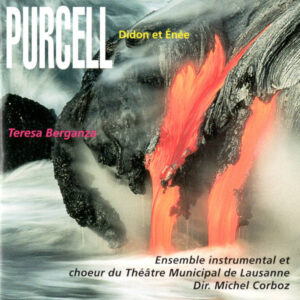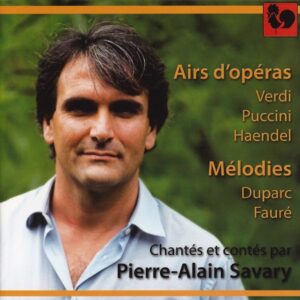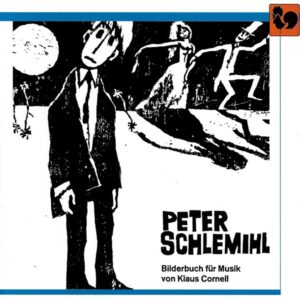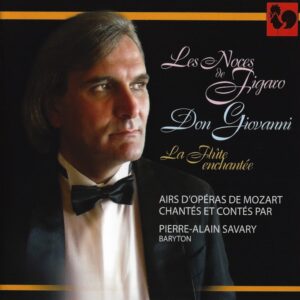Extraits / Excerpts
Offenbach: Monsieur Choufleuri restera chez lui le... Opéra-bouffe en un acte - Ensemble Instrumental de Grenoble - Jean-François Monot
Jacques OFFENBACH: Monsieur Choufleuri restera chez lui le… Opéra-bouffe en un acte: Ouverture – No. 1 Couplets, J’étais vraiment très ignorante (Ernestine) – No. 1 bis Dialogue. Ernestine ! Chère Ernestine (Babylas Ernestine) – No. 2 Pedro possède une guitare (Babylas Ernestine) – Dialogue. Et je n’épouserai pas (Ernestine, Babylas, Choufleuri, Petermann) – No. 3 Couplets. En naissant chaque créature (Petermann) – Dialogue. John ! John ! Mon ami (Choufleuri, Petermann, Ernestine) – Babylas ! Babylas ! Babylas ! (Ernestine, Babylas, Choufleuri) – No. 4 Dialogue. Qui est et d’où vient ce jeune homme (Choufleuri, Ernestine, Babylos, Petermann) – No. 5 Chœur et ensemble. Le plaisir nous invite (Choeur, Petermann, Choufleuri, Balandard, Mme Balandard) – Dialogue. Bonjour cher Balandard (Choufleuri, Mme Balandard, Petermann, Ernestine, Balandard, Babylas) – No. 6 Trio italien. Italia la bella et reprise de l’ensemble (Ernestine, Babylas, Choufleuri, Petermann) – Dialogue. Bravo ! Mon Dieu que c’est beau ! (Mme Balandard, Balandard, Babylas, Choufleuri) – Final (Tous)
Choufleuri: Charles Ossola
Ernestine : Danielle Borst
Babylas: Serge Maurer
Petermann: Samuel Hasler
M. Balandard: Pascal Meyer – Jean Not
Mme Balandard: Catherine Berney – Simone Collet
Ensemble Instrumental de Grenoble, Jean-François Monot, Conductor
Chœur lyrique de Suisse Romande, Florence Grivat, Conductor.
Jacques Offenbach
“The little Mozart of the Champs-Elysées!” exclaimed Rossini during a performance of “Marriage aux Lanternes”. Although Offenbach was never very gentle with the composer of “The Barber of Seville”, whom he often targeted with his verbal sarcasm and comical imitations. Jacques Offenbach (real name Jakob Eberst) was the son of a Cologne synagogue singer. At the age of 13, he left for Paris, where, in a remarkable honour for a foreigner, he attended the cello classes at the Conservatoire. Les Bouffes Parisiens, Les Variétés, Le Palais Royal, Les Folies Dramatiques, and La Gaité Lyrique, are various stages of his triumphs. Uncontested but ambiguous triumphs, the Court of the Second Empire, the nobility, and the newly rich bourgeois class are the victims of his zest and verve, his corrosive irony, yet somewhat complacent at the same time.
La Belle Hélène, La Vie parisienne, Orphée aux Enfers, La Périchole, and La Grande Duchesse de Gerolstein got this decadent society singing and dancing, which Napoleon III wanted to stun and dazzle the better to cause its ruin. Offenbach died in 1880 without having seen his masterpiece, “Tales of Hoffmann”, performed on stage.
“Mister Choufleuri Will Remain at Home On…”
This comic opera is certainly one of Offenbach’s masterpieces, as much for its make-up — very developed musical effects, closely related to the best trios of the repertoire — as for the comical imitations of the great masters who, as always with this “serious-humoristic demon”, are as full of genius as their illustrious models.
Around Choufleuri, a newly rich, stupid and pretentious bourgeois, a sort of “Mister Jordan” of the Second Empire, is gathered all the society from the Parisian salons of the day, often composed of adventurers and newly rich trying to cultivate refinement without a real desire to do so. This society is made a fool of by the acidic verve of this “new buffoon”.
There is a bit of complacency and quite a lot of disgust in Offenbach’s gaze. And especially a rare sense of comedy. Certainly not least comical is the fact that hidden under the pen name of Saint-Rémy, author of the book, is no less a person than the Duke of Morny, half-brother and minister of the emperor, who believed that when people were busy amusing themselves, they had no time for building street barricades.
- Categories
- Composers
- Interprets
- Booklet













